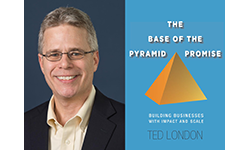A Book For BoP Enterprise Leaders
Friday, January 15, 2016
Across 25 years and more than 80 countries, WDI Senior Research Fellow Ted London has explored the intersection of business development and poverty alleviation.

This includes deep involvement in the evolution of the base of the pyramid (BoP) beginning 15 years ago. At that time, the idea of the BoP was still considered a novel theory and the challenge was in helping the business and development communities see what was possible – that world’s poorest 4 billion people weren’t just recipients of donations, but active participants in a market economy.
Since then, he has engaged with and heard from leaders of many organizations claiming success, but not fully understanding what was and wasn’t working. London is now at the forefront of the next evolution of the development of the BoP domain – when the question has changed from “Should we invest in a BoP enterprise?” to “How can we make our investment in a BoP enterprise work better?”
For this latest phase, London has applied his accumulated research and knowledge for a new book. “The Base of the Pyramid Promise: Building Businesses with Impact and Scale,” published by Stanford University Press in 2016, was written with the specific goal of equipping enterprise leaders and their partners with the tools, frameworks, and actionable strategies to build sustainable and scalable BoP enterprise that truly alleviate poverty.
“I wanted to capture what we have learned by working with BoP enterprises,” said London, who also is vice president of WDI’s Scaling Impact Initiative. “While there is no guarantee for enterprise success, by better understanding the lessons from our successes and our failures, we can increase the likelihood of success.”
The book centers on three key components that enterprise leaders and their partners in the development and NGO sectors must integrate to achieve results: strategies for building sustainable, scalable enterprises; tools for enhancing value creation; and, frameworks for developing a robust and evolving partnership ecosystem.
“This book is based on 25 years of work,” London said. “We now know enough about BoP enterprises that we can, and indeed must, leverage the lessons learned along the way.”
London also was the co-editor and chapter author of the 2010 “Next Generation Business Strategies for the Base of the Pyramid” in which he and seven other leading BoP thought and practice leaders showed how to apply BoP innovations, techniques, and business models.
“What I hope is that entrepreneurs, enterprises, and others interested in learning more about how to build and grow sustainable enterprises – while simultaneously alleviating poverty – will find ‘The Base of the Pyramid Promise’ useful,” he said. “I think the book will have an impact, allowing more sustainable, scalable BoP enterprises to flourish. But it’s just one milestone in a long journey. There are more questions and issues to tackle in the future.”
